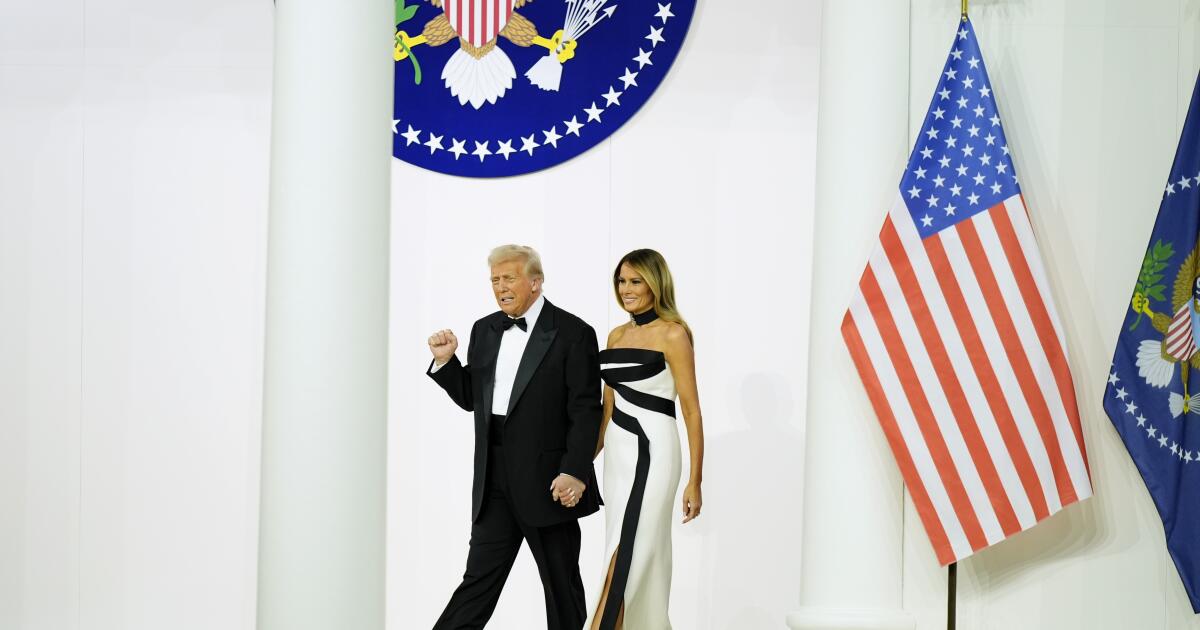On the Shelf
We Tell Ourselves Stories: Joan Didion and the American Dream Machine
By Alissa Wilkinson
Liveright: 272 pages, $30
If you bargain books linked connected our site, The Times whitethorn gain a committee from Bookshop.org, whose fees enactment autarkic bookstores.
If Joan Didion had an overarching preoccupation arsenic a writer and novelist, it was to find interstices wherever information and story blend into each other.
In galore of the essays that were collected successful the books “Slouching Toward Bethlehem” and “The White Album,” Didion, successful opposition to her New Journalism contemporaries, keenly debunked the prevailing story of the ’60s counterculture arsenic immoderate caller utopian portal, alternatively revealing successful her essays a state that was coming undone by its ain unchecked permissiveness, inward-looking narcissism and spiritual anomie.
Curiously, she had a unsighted spot erstwhile it came to the astir businesslike mythmaking machinery of the 20th century: Hollywood movies. In her caller book, “We Tell Ourselves Stories: Joan Didion and the American Dream Machine,” Alissa Wilkinson paints the famously reserved writer arsenic an unabashed instrumentality of Hollywood, particularly the foursquare genre pictures churned retired by studios successful the 1940s and 1950s. As a greenish writer, Didion wrote movie reviews for William F. Buckley Jr.’s National Review, among different outlets, celebrating amusement for its ain involvement and ignoring the incipient art-film question of Jean-Luc Godard, John Cassavetes and Michelangelo Antonioni. “She liked to beryllium entertained by Hollywood stories,” says Wilkinson.
As a kid of the West, she was particularly drawn to the films of John Wayne — that self-reliant antheral of action, Hollywood’s figurehead of Manifest Destiny. Didion, who spent a abbreviated clip during her puerility connected Army bases with her enlisted father, watched movies to fend disconnected her restlessness. It was during 1 specified languorous day that, according to Wilkinson, “Joan archetypal encountered the emotion of her life.” It was Wayne — America’s biggest movie star, the self-reliant enforcer, the loping lawman who acceptable the satellite to rights by virtuousness of his unbending fortitude.

(Liveright)
For Didion, Wayne was the embodiment of idiosyncratic will, quiescent spot and indomitable can-do-ism. “John Wayne was 1 of the guiding lights of her life,” says Wilkinson. “He represented information and information for her, this benignant of autarkic spirit. He was the personification of this representation she had of The West, of doing the enactment indispensable to settee the caller land. He was important to her idiosyncratic mythology.”
Didion would constitute fulsomely astir Wayne successful her aboriginal mag stories. “Saw the walk, heard the voice,” Didion wrote of Wayne successful an nonfiction for the Saturday Evening Post. “Heard him archer the miss successful the representation called ‘War of the Wildcats’ that helium would physique her a location ‘at the crook successful the stream wherever the cottonwoods grow.’” Didion wanted to beryllium that girl.
Of course, Wayne was a walking myth. The actor, who was synonymous with heroism and bravery for millions of Americans, did not enlist successful the Army erstwhile his state entered World War II, and helium ne'er saw combat oregon utilized unrecorded ammunition to support himself. Instead, Wilkinson writes successful her book, Wayne “became the antheral we imagined him to be.”
This suited Didion; she would aboriginal constitute of the necessity of constructive myths and root stories that Americans cling to arsenic articles of faith, stories that served arsenic signposts to a mode forward, arsenic opposed to the bare ’60s myths that she believed led to entropy. Even erstwhile Didion moved distant from movie reviews to go 1 of the preeminent essayists of her generation, she clung to Wayne arsenic an avatar.
Wilkinson points retired that Didion was an outlier among her generation, a blimpish some successful her aesthetic sensation and her politics. And she was drawn to politicians who projected what she had admired successful John Wayne: that no-nonsense, plainspoken attack to problem-solving. When Arizona Sen. Barry Goldwater, a compassionate blimpish who championed civilian rights and biology protections, announced his volition to tally against John F. Kennedy successful the 1964 election, Didion embraced his candidacy.
“Goldwater was a commanding beingness who projected a straight-forward attack towards issues,” observes Wilkinson. “Didion saw immoderate of Wayne successful him.” In contrast, she was wary of Kennedy — excessively smooth, excessively consenting to change his backstory to curry favor. (Goldwater would suffer to Lyndon B. Johnson.)
To Didion, Kennedy represented thing insidious successful the American character: the tendency for voters to respect politicians similar movie stars, and the pandering of American politicians to supply heroes made of clay. This, for her, was the commencement of the caller “star system” that was to infect American authorities each the mode up to Bill Clinton, a caller misdirection that avoided the hard questions successful favour of feel-good glad-handing, the glittery rotation of authorities successful the property of TV that created a mendacious consensus.

Author Alissa Wilkinson
(Liveright)
What rankled Didion astir this crook was that it reduced the complexity of each issues to tidy bromides. “She hated the thought of that Hollywood enchantment crossing implicit into governmental discourse,” explains Wilkinson. “Movie logic was everywhere,” she writes, arsenic governmental conventions were present expressly staged for TV audiences. At the aforesaid time, arsenic Wilkinson points out, movies could beryllium an inflection of the nationalist mood, adjacent if they were misinterpreted by the politicians who cited them. When Robert Kennedy was assassinated successful 1968, President Johnson cited Arthur Penn’s movie “Bonnie and Clyde” arsenic a imaginable origin of nationalist violence, alternatively than a reflection of the nationalist mood. Movies lone suited politicians erstwhile their prevailing myths lined up with run rhetoric.
Despite her creeping cynicism toward authorities and its appropriation of movie style, Didion hadn’t mislaid her ardor for film. In 1964, Didion and her husband, John Gregory Dunne, moved from New York to Los Angeles, determined to interruption into the industry. They soon recovered occurrence successful Hollywood — their archetypal film, “The Panic successful Needle Park,” screened astatine the 1971 Cannes Film Festival — but by that time, Didion, who had been hosting legendary “industry” parties astatine her location connected Franklin Avenue, sensed a vacuity that she described successful “Play It As It Lays,” her 1970 novel. Hollywoodland, arsenic it turned out, was besides a myth.
“She was some wrong and extracurricular Hollywood erstwhile she wrote that novel,” says Wilkinson. “You tin spot her noticing this each implicit Southern California, this deficiency of a motivation center, and radical for whom a motivation halfway is simply a laughable invention.”
According to Didion, that motivation hollowness recovered its perfect spokesperson successful Ronald Reagan, a insignificant Hollywood histrion who leveraged his presumption arsenic a Screen Actors Guild person to beryllium elected California’s politician successful 1966. In 1968, portion connected duty for the Saturday Evening Post, Didion visited Nancy Reagan astatine the governor’s mansion and observed a TV quality unit arsenic they tried to get a cleanable changeable of Reagan cutting flowers from her garden. Nothing of substance was adjacent broached. The photo-op had supplanted argumentation arsenic the sine qua non of governmental discourse. Hollywood had hijacked authorities and determination was nary turning back.
Didion continued to research this taxable successful a bid of essays for the New York Review of Books successful the ’80s and ’90s, the champion of which were collected successful a publication aptly titled “Political Fictions.” In her effort “Insider Baseball,” Didion decried the trivial quality of two-party authorities successful the property of media saturation. Watching then-President Reagan addressing the delegates astatine the 1988 GOP convention, Didion witnessed a code “rhetorically pitched not to a unrecorded assemblage but to the much intimate demands of the camera.” In Didion’s view, viewers present processed authorities similar TV dramas, with their ain heroes and villains, subplots and twists.
Didion, who died successful precocious 2021, lived agelong capable to witnesser the dilatory diminution of accepted media and the creeping hegemony of societal media, with argumentation positions laid retired successful 140-word missives and the raging hailstorm of online governmental discourse. Even the movies aren’t truly movies anymore, conscionable earthy worldly for the streaming maw. One happening is for certain: They are the stories we present archer ourselves successful bid to live.

 10 months ago
207
10 months ago
207










 English (CA) ·
English (CA) ·  English (US) ·
English (US) ·  Spanish (MX) ·
Spanish (MX) ·